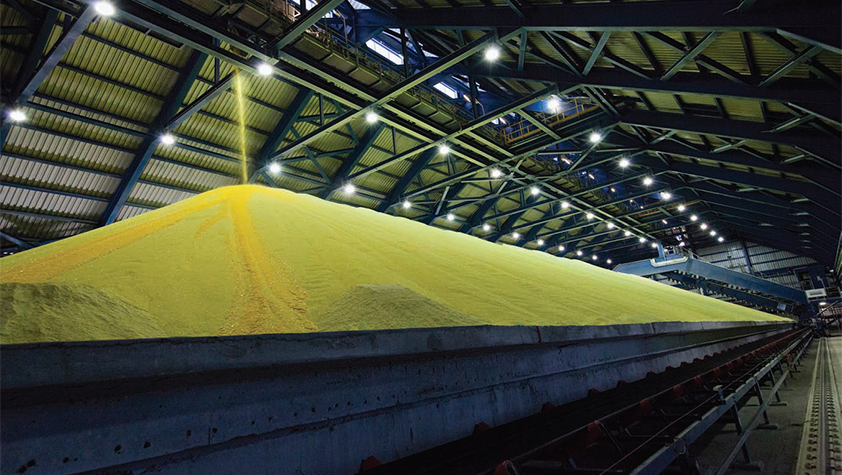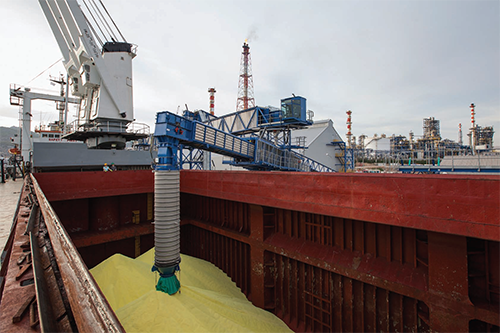
Behind the Scenes: How Sandvik Engineers Advanced Solutions for Niche Sectors
In the process
For over 150 years Sandvik has been engineering high-technology, advanced products for a wealth of specialist niche markets.
These operations are based on unique expertise in materials technology and extensive insight into customer processes. As a Group, Sandvik concentrates on five main business areas, one of which contains Sandvik Process Systems. This world-leading manufacturer produces steel belts, and steel belt-based processing systems, which contribute to customer productivity, reliability, cost efficiency, and reduction of environmental impact.
One key application for this expertise is sulphur solidification and handling systems. This has in recent years seen Sandvik Process Systemsbecome a partner to several internationally renowned engineering companies serving the petrochemical industry. In total the company has delivered sulphur solidification solutions to over200 customers, totaling 600 plants worldwide, the latest of which is Hellenic Petroleum’s Elefsis refinery in Athens, Greece.
This is part of a large-scale modernisation programme taking place at the refinery, which will see it able to produce ultra low sulphur fuels in accordance with the new European and international specifications, as well as improving its ability to handle different kinds of crude. Other goals include a significant reduction in emissions, efficiency enhancements and improved safety conditions.
By reducing the amount of sulphur in its products though the refinery faced a challenge in terms of storing and transporting this waste material. As such in January 2009, Sandvik was selected to supply a turnkey end-to-end sulphur solidification and handling system at Elefsis in order to counter this. This builds on a long-standing relationship between Sandvik and Hellenic Petroleum, which dates back to 1986. “In this case the project consisted of three main parts – the solidification system where we turn the liquid sulphur into solid pastilles, a storage capability for this product, and a means of discharging it onto a ship,” begins Ulrich Nanz, sales and marketing director of Sandvik Process Systems.
“As such we delivered this in partnership with our sister company Sandvik Mining in Finland, which delivered the downstream storage and handling activity, whilst Sandvik Process Systems supplied the core solidification system. This underlines our competence as a Group in handling larger packages of work for EPC contractors,” he continues.
Commissioned in August 2012, the solidification system is based upon Sandvik Process Systems’ patented Rotoform technology, the basic principle of which is that droplets of liquid sulphur are deposited onto a continuously running stainless steel belt that is then cooled from the underside by sprayed water to form solid pastilles. As the Rotoform produces these materials mechanically, subsequent grinding or crushing is not required therefore eliminating associated costs, noise, and dust, which can be an environmental concern.
“Our process is the only indirect sulphur solidification method available on the market as the steel belt means that there is no cross-contamination between the water and sulphur. All competing systems are direct processes, which either cool the sulphur using air or water, which leaves the client with sour water or dust emissions. This makes the Rotoform process incredibly clean in comparison,” notes Ulrich.
 This latest incarnation of the Rotoform technology has previously been installed in two other facilities for Bapco in Bahrain and Reliance in India. Its use at Elefsis provides Sandvik Process Systems with a reference project within Europe, which will benefit the business in promoting its capabilities in this market – a region where Ulrich predicts demand will continue to grow: “The main driver behind the modernisation of Elefsis was to enable Hellenic Petroleum to sell their products in Europe under current regulations, and this is the case for many other operators as well. At present specification in Europe under Euro 5 is some of the toughest in the industry, and we will see Euro 6 introduced in 2014, so in order to comply with this producers have to remove the sulphur from their products.
This latest incarnation of the Rotoform technology has previously been installed in two other facilities for Bapco in Bahrain and Reliance in India. Its use at Elefsis provides Sandvik Process Systems with a reference project within Europe, which will benefit the business in promoting its capabilities in this market – a region where Ulrich predicts demand will continue to grow: “The main driver behind the modernisation of Elefsis was to enable Hellenic Petroleum to sell their products in Europe under current regulations, and this is the case for many other operators as well. At present specification in Europe under Euro 5 is some of the toughest in the industry, and we will see Euro 6 introduced in 2014, so in order to comply with this producers have to remove the sulphur from their products.
“Our pastille product is one of the very few that meet the Sulphur Development Institute of Canada (SUDIC) recommendations for premium sulphur. This is an international standard that defines everything from moisture and dust content to size distribution, so our clients can be assured of the quality of their product,” he adds.
Another major driving force in choosing such equipment is lifecycle costs. “Customers now look at the initial cost of investment combined with the first five years of operations,” elaborates Ulrich. “Our technology not only has very low consumption of energy, but it also has an on-stream factor of 96 per cent, which means it is incredibly reliable with very minimal maintenance to also lower running costs. In Hellenic Petroleum’s case they have 1200 metric tonnes of liquid sulphur coming out of Elefsis every day and if our machines are down they cannot switch off the refinery, nor do they have significant capacity to store liquid sulphur, so reliability is a number one concern.”
The completion of the work at Elefsis marks the fifth such project where Sandvik Process Systems and its sister companies have delivered a complete end-to-end solution. The ability of the Group to deliver these highly reliable technical solutions, which have minimal environmental impact, suggests that this approach will continue into the future.
Sandvik Process Systems
Products: Processing systems based on steel belts